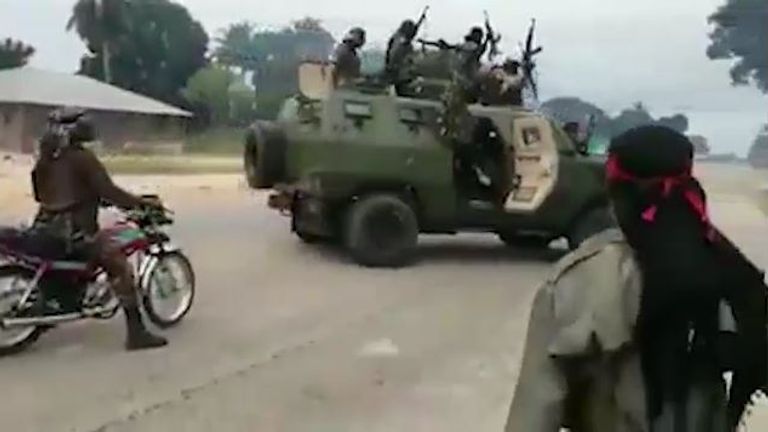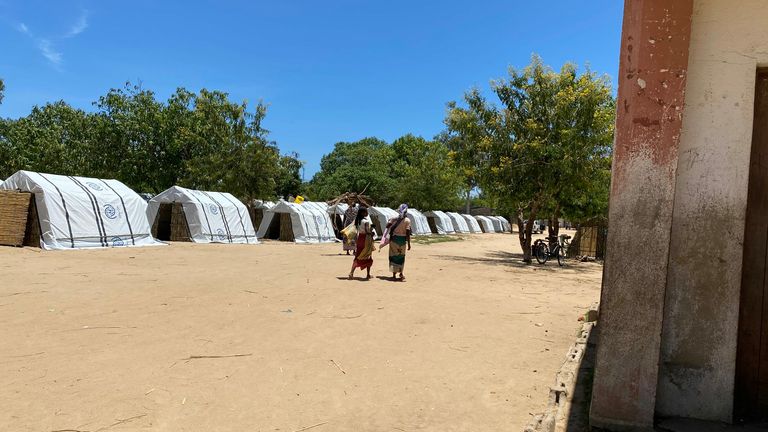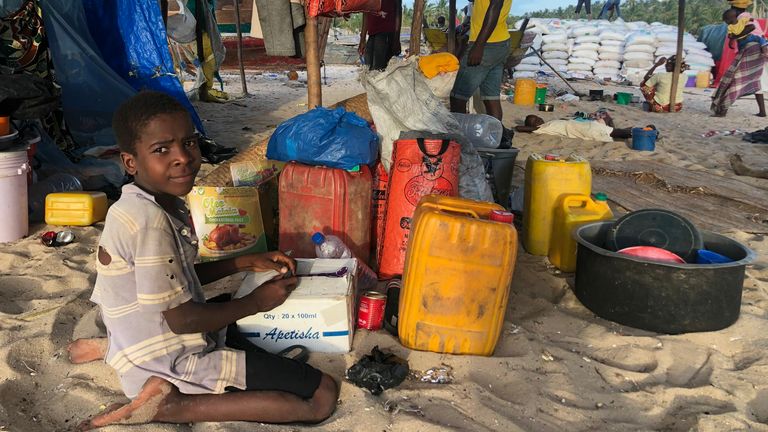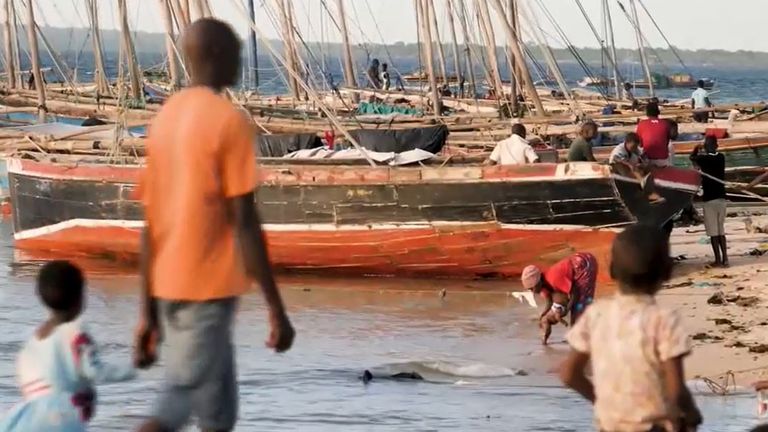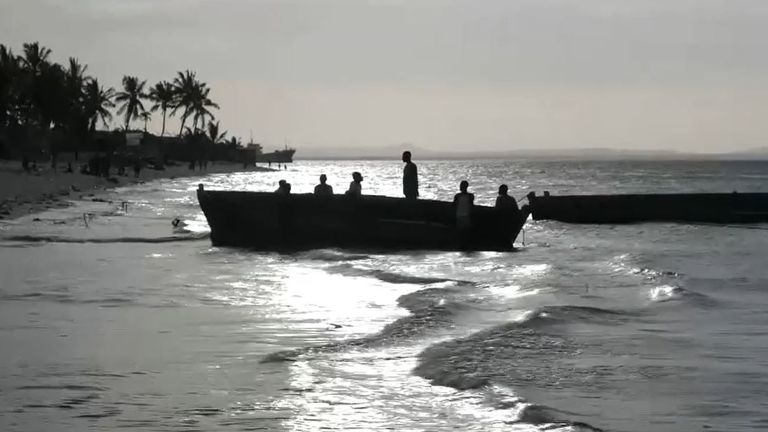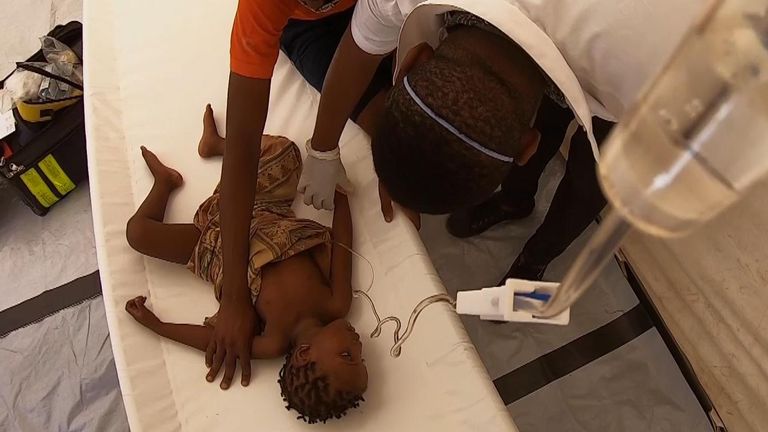You can see the boats sail into Pakaquiteta beach every morning, carrying people and possessions from an area in Mozambique that is known as “the land of fear”.
More than half a million people have fled from northern parts of the country’s most northerly province, Cabo Delgado, and thousands of evacuees have sought sanctuary on this scruffy-looking beach, located in the heart of the region’s biggest city, Pemba.
This exodus has been fuelled by a vicious band of Islamist extremists who have opened a new front in the war on terror.
Explained: Why have 500,000 people been forced to flee their homes in Mozambique?
The conflict began in late 2017 and has cost the lives of at least 2,500 people – but it has gone largely unnoticed in the rest of the world.
The consequences are impossible to miss in a spot like Pakaquiteta, however. Families have erected tents and lean-to structures in the middle of the beach and they beg for food from passers-by.
“How long can you go on living like this?” I asked an evacuee, called Zena Dade, who has been living on the beach for the past nine months.
“We don’t know how we are going to get out of this situation. We haven’t had any help,” she replies.
The mayor of Pemba, Florete Simba Motarua, told us that the population of the city had grown by 138,000 people over recent months and admitted there was “pressure on everything”.
He said: “Clean water, hospitals, children going to schools. We don’t have schools. The international community must come and help us.”
In the neighbourhood which adjoins Pakaquiteta beach, we found thousands of new arrivals who had squeezed themselves into the impoverished community.
We met the Tchato family, who were sat around a dank open-air compound at the end of shadowy passage.
They had been driven from their farm in a town called Macomia back in May. Now, 40 members of the extended family eat and sleep on a miniscule patch of land.
“We are not living well, as you can see, sometimes we eat, sometimes we don’t. We are really suffering,” said one man called Ona.
The adults were hungry and the children unwell, their skin plagued by bacterial infections – and they were traumatised by the men who attacked them.
“When they come, they cover their heads, you only see the eyes. I didn’t recognise them,” said another family member, called Lucia Asani.
She says the insurgents murdered her brother, then took her three nieces away.
“First of all, it was Salima. She was picking mangos when they kidnapped her. The second one was Awa. She went to get water and they took her away. My brother went to the beach but the insurgents beheaded him,” she says.
At first, the Mozambican government dismissed the militants as mere bandits.
But the insurgents – who are variously called “Ahl al-Sunnah wa al Jamma’ah” or, more popularly, “Al-Shabaab” – have destabilised this isolated and economically deprived province.
Last August, they took the strategically important port of Mocimboa da Praia, killing 50 soldiers in a single ambush – and they have launched, at last count, 769 organised attacks.
Mozambique‘s poorly led – and poorly trained – military has struggled to assert itself, and the central government has said little about the situation internationally.
South Africa’s minister for international relations, Naledi Pandor, recently expressed her frustration with her partners in Mozambique.
She said: “(It) remains a very worrying puzzle to us as the South African government. We have made every effort to reach out…”
If the government does have a strategy, it almost certainly involves protecting a large natural gas development on Cabo Delgado’s Afungi peninsula.
The $15bn (£10.9bn ) project is owned by French oil giant Total, and it is widely believed that the government and the company have reached an agreement to enhance the installation’s security.
In the great displacement camps now expanding around the city of Pemba, fears of insurgent attacks have been replaced by a different sort of conflict – the daily struggle to survive.
In a ramshackle settlement called “25th of June”, residents lack basic facilities like clean water and functional sanitation and it was clear that sickness was rife.
We saw several people vomiting during our visit and there were others who had collapsed near a small clinic run by Doctors without Borders (MSF).
The nurse on duty was called Milton Fernando, and he was dripping with sweat when we spoke. He said the majority at the camp were malnourished and there were some who had contracted malaria.
More worryingly, however, he told us they were now dealing with a major outbreak of cholera.
“This child is in a bad way, yes, she has severe dehydration,” he said, as he pointed to a four-year-old girl called Helena. “We had to put her on a drip immediately. I am very worried about her.”
MSF told us they are treating hundreds of people for cholera, a potentially fatal condition caused by contaminated food and water.
Helena was bundled up by her father in the back of MSF’s 4×4 and driven at speed to a larger treatment facility – and we have been told that she is likely to survive.
But she became sick in this camp and she will have to return if she is able to complete her recovery.

